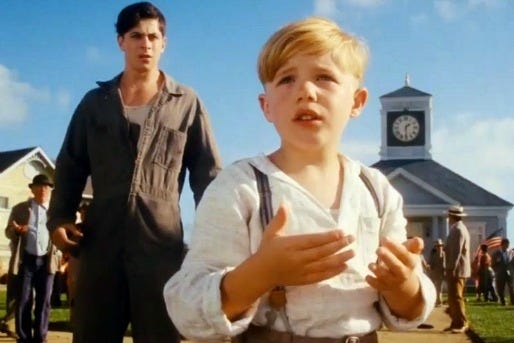Little Boy

"Little Boy" is a little film that, like its main character, seemingly has no friends. I guess I'll have to do.
This sweet and, yes, somewhat sappy movie is being released into a few theaters with very little fanfare or media. (No screenings were arranged for critics; heck, we weren't even told it was coming out. I had to backdoor it to the studio's publicity chief to beg an online screener.)
It's a faith-based production, which tend to be seen as less legitimate by the press and audiences of a certain persuasion. As if stories and characters that come from the wellspring of Christian beliefs somehow cannot be worthy as, say, the latest horror flick or mushy romance.
I was raised Catholic myself, and if "fallen" isn't quite the right descriptor that requires being added to that designation, then let's just say I'm a few floors down from flush.
Still, the religious aspects of the film are not a wall but an invitation. I found "Little Boy" to be an utterly charming picture with a terrifically engaging performance by young Jakob Salvati as Pepper Flynt Busbee.
Pepper is being raised in the idyllic California fishing town of O'Hare during World War II. Eight years old, he's still the size of a toddler. Earnest and intelligent, Pepper wonders if he really is a "midget" like he keeps getting called. The local doctor (Kevin James) isn't sure if Pepper actually has dwarfism, or if he's just a "little boy."
Alas, nicknames like that tend to stick; soon all the other kids in town bully and mistreat him. His only friend is his dad (Michael Rapaport), who plays all sorts of games of imagination with him where they pretend to be cowboys, or pirates, or masked detectives, and so on. Their adventures always conclude with dad asking Pepper, "Partner, do you believe you can do this?!?"
The lad's faith is tested when Dad goes off to war and is soon declared a prisoner of war. Worse, Pepper follows his volatile older brother London (David Henrie) in taking his frustrations out on Hashimoto (Cary-Hiroyuki Tagawa), the local Japanese-American who suffers a similar ostracism from the townsfolk.
Father Oliver (Tom Wilkinson), the gutsy town priest, takes Pepper under his wing and advises him to keep his faith that his father will come home. The priest gives him a list of actions he must perform in order to build his faith: clothe the naked, feed the hungry, shelter the homeless, etc. Chief on that list, which is part penance and part hope, is to befriend Hashimoto. The slow, tenuous way in which the boy opens up to the "foreign" stranger is quite stirring.
But the boy is also taken with the idea of Ben Eagle, a magician/hero of the serial movies and comic books Pepper consumes. When a live stage version of Ben Eagle comes to town, Pepper is picked out of the audience to perform a feat of telekinesis that, of course, he believes is real.
In the kid's mind, the teachings of the priest and the charlatan sort of get mashed up together. Pepper begins to think he's capable of actual superpowers, pointing his hands and groaning with concentration. Every evening, Pepper performs his prestidigitations toward the setting sun, where his father is a prisoner.
It's a great-looking movie, with authentic period costumes and cars, and bright, sun-dappled cinematography. Visually and thematically, it reminded me a lot of "Forrest Gump."
Some might dismiss the story — director Alejandro Gómez Monteverde co-wrote the script with Pepe Portillo — as pure pap. And it surely is an earnest, sentimental picture. But I believe "Little Boy" earns its emotions, by carefully showing how the characters arrive at their feelings instead of just assuming they're there.
And Jakob Salvati holds our attention, and our emotions. With his open face and green-gray eyes, he evokes a sense of inner toughness and sensitivity in equal measures. Emily Watson also has a nice turn as his mother, dealing with challenges from several fronts.
I'm really glad I saw "Little Boy." Sometimes, you just have to exert your will — and show a little faith — to achieve your goals.
4 Yaps



